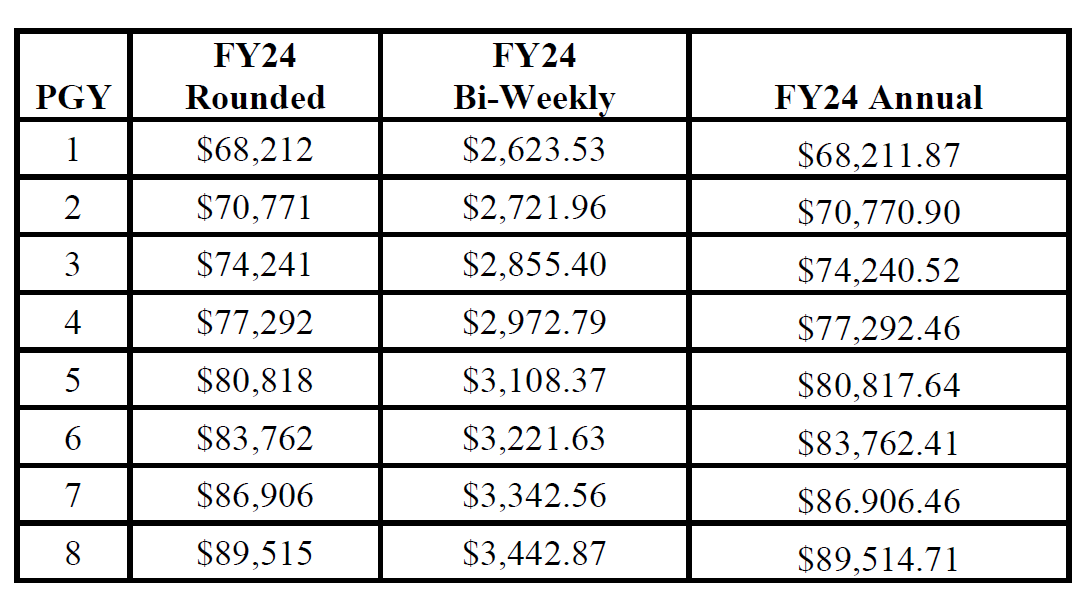Program Curriculum
All residents in the combined Anatomic Pathology (AP) and Clinical Pathology (CP) track are required to spend at least 24 months of structured training in AP, and 18 months of CP prior to matriculation. The remaining 6 months can be spent in supervised elective rotations, which may be chosen in the third and fourth year of residency. Electives may be chosen as additional in-depth training in any AP or CP subspecialty areas. In addition, residents are allowed to spend up to two months of elective rotations at other institutions "away elective" provided approval of the outside institution.
ANATOMIC AND CLINICAL PATHOLOGY CURRICULUM
PGY-1
Anatomic Pathology: 8.5 Months
- Surgical Pathology (Boot Camp) -- 1 month
- Surgical Pathology -- 4 months
- Autopsy -- 2 months (including 1 week each of: Neuropathology, Renal, Perinatal, Bone and Soft Tissue pathology and Dermatopathology)
- Cytology -- 1 month
- Hematology/Flow Cytometry -- 2 weeks
Clinical Pathology: 3.5 Months
- Chemistry -- 1 month
- Microbiology -- 1 month
- Transfusion Medicine -- 1 month
- Hematology -- 2 weeks
PGY-2
Anatomic Pathology: 7.5 Months
- Surgical Pathology -- 4 months
- Autopsy -- 1 month (including 1 week each of: Perinatal, Renal, Bone and Soft Tissue pathology and Dermatopathology)
- Cytology -- 1 month
- Dermatopathology -- 2 weeks
- Forensics -- 2 weeks
- Hemepath/Flow Cytometry -- 2 weeks
Clinical Pathology: 4.5 Months
- Chemistry -- 1 month
- Microbiology -- 1 month
- Transfusion Medicine -- 1 month
- Hematology -- 2 weeks
- Cytogenetics -- 1 month
PGY-3
Anatomic Pathology: 7 months
- Surgical Pathology -- 4 months
- Autopsy -- 1 month (including 1 week each of: Perinatal, Renal, Bone and Soft Tissue, and Bone and Soft Tissue Pathology)
- Dermatopathology -- 2 weeks
- Cytology -- 1 month
- Hemepath/Flow Cytrometry -- 2 weeks
Clinical Pathology: 3 Months
- Hematology -- 2 weeks
- Transfusion Medicine -- 1 month
- Chemistry -- 1 month
- CP Molecular -- 2 weeks
Electives: 2 Months
PGY-4
Anatomic Pathology: 4.5 Months
- Surgical Pathology (pre-attending) -- 1 month
- Autopsy (pre-attending) -- 1 month
- AP Molecular -- 1 month
- Dermpath -- 2 weeks
- Frozen section -- 2 weeks
- Hemepath/Flow Cytometry -- 2 weeks
Clinical Pathology: 3.5 Months
- HLA -- 3 weeks
- Toxicology -- 3 weeks
- Microbiology -- 1 month
- Hematology -- 1 month
Electives: 4 Months
DIDACTICS/TEACHING CONFERENCES:
The program has a rigorous didactic schedule. In July, all PGY1 and PGY2 residents are required to attend a series of introductory lectures given daily by faculty in the AP and CP divisions. The purpose of these lectures is to provide the residents with a solid foundation in pathology to prepare them for a strong start. The AP lectures cover basic histopathology, grossing techniques of all organ systems, and methods of triaging specimens and common ancillary studies specific for each system. In CP, faculty introduce residents to the basic concepts of the four core subspecialties: Chemistry, Microbiology, Hematology and Flow Cytometry, and Transfusion Medicine.
Starting in August, all residents are required to attend the weekly teaching conferences that include a variety of teaching sessions/formats, such as: unknown surgical pathology slide conference, anatomic pathology (AP) microscopy slide session, fellows teaching conference, gross conference, autopsy conference, clinical pathology (CP) teaching session, CP case presentation (unknown), journal club, hematopathology cytogenetics conference, and pathology grand rounds presented by residents and fellows. All conferences are conducted every Tuesday morning from 8:00am to 1:00pm, which is considered protected time for residents when they are freed of all clinical duties. Residents are also required to attend Quality Assurance (QA) / Quality Improvement (QI) sessions, laboratory administration and patient safety sessions. In addition, residents present at the various multidisciplinary tumor boards, and participate in teaching medical students rotating in the department. Residents are also encouraged to attend the daily AP consensus conference.
